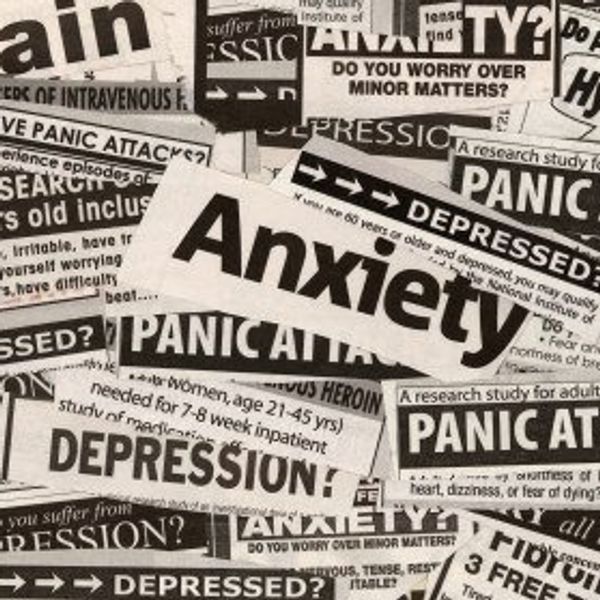So, it is a New Year, and today marks my first article of 2017. I’m not here to talk about some cliché “new year, new me,” but I did think it would be an appropriate time to talk about something that I have been holding in for years. I always thought there would be some perfect time to come out and speak about this in an epiphany-like way, but I don’t think that time will ever come. I think sometimes it’s important to take a leap of faith and trust yourself enough to know that being honest will pay off in the long run.
To start, my being open about this struggle is definitely not me trying to throw myself a pity party. In fact, it’s something I’m actually very ashamed and embarrassed of and something that I am extremely nervous about sharing. I feel like it’s held me back for years, and has been something that makes having healthy relationships with people difficult for me. It has weighed me down for a while and been a defining characteristic of me. But, I really don’t want it to weigh me down anymore, and I think by being honest about it, I can start to make positive steps forward in my life.
About 4 years ago, I was diagnosed with clinical depression and anxiety. This didn’t come as too much of a surprise because my parents had just gotten a divorce, and I was in the thick of high school — trying to figure out who I was, who my friends were, and basically what the hell I was doing and why. I guess you could say I was a very typical “angsty” teen. I went to therapy, and my therapist explained that I probably wouldn’t have this problem for long, and that once my parent’s situation kind of settled itself, I would return back to my happy-go-lucky self. Unfortunately, that’s not how it went down. It ended up getting worse as the years of high school went by, and the things I used to like and the people I used to hang out with didn’t make me happy anymore (to no fault of their own). It was incredibly difficult to get out of bed in the morning and to go about my day like I used to be able to do. I was constantly tired, and I didn’t feel like there was any point in making any sort of effort for anything because I didn’t think I had a point or a purpose. I was constantly paranoid that I was letting the people around me down, and I couldn’t sleep at night because my mind would go a million miles a minute. My brain was battling between sadness and lethargy, and over-excited worry.
I cannot describe in words how hopeless I felt. No matter how hard I tried, I couldn’t shake the feeling of darkness that surrounded me. It completely sucked, and it was so hard to explain to those that loved me because there really is no way to put it in words sufficient enough to do the feelings justice. Even as I’m writing this now, I’m going back to my darkest moments and can remember the physical pain I felt as a result of my mental state. It is all-consuming, and beyond frustrating because it just doesn’t go away.
What made things even more difficult was that I was a very high-functioning person on the outside. I still did very well in school, was succeeding for the most part in my sport, and was honestly just very good at putting on a happy face. Very few people knew what I really felt on the inside, and those that do know were people I could trust 100 percent. I felt bad for my parents, because they were doing everything they could to help me, but it just wasn’t working.
After a few therapists and psychiatrists, I finally found one that fit for me. She was amazingly understanding and incredibly real- she always gave it to me straight even when I might not have wanted to hear it. I was given proper medication that worked for me (each medicine works differently for different people) and everything began to even itself out a little bit more. I was adjusting better to my new living situations, and starting to find the joy of the little things I used to before my diagnoses. Sometimes I would have really bad days, and I still do now, but I’ve learned that it is okay not to be okay. I think my biggest struggle was that I was not able to accept the fact that I couldn’t be in control of my emotions all the time. Since I was very young, I have always been a perfectionist, so it was hard for me to accept the fact that I was struggling. It was also hard to hear from my loved ones, “you’ve changed” or “you’re not the same happy girl you used to be”. That hit home for me, and I wanted nothing more than to be my old self again.
What I have realized through this process, though, is that change is good. At the time, the changes I was going through were awful, but now as I look back and continue to grow and mature, I’ve realized that there isn’t a “before depression/anxiety me” and “after depression/anxiety me” because this is my life, and it’s all me. It’s all a part of my story, and it’s my own unique story to nurture and cherish. It will always be a way I can define myself, and I think that is pretty cool, because when you think about it, everyone else probably has a little part of them that has made them the stronger and the well-rounded people they are today.
I guess the reason I am writing this too is because there is so much stigma surrounding mental illness and the sad part is, most of it is self-inflicted. My purpose in writing this is to both accept myself publically, and at the same time try to encourage others that don’t know about mental illness that it is very normal, and shouldn’t be made fun of. Our world is so open these days, and I think it would be great if we could be more open about these topics to promote a more accepting society.
Some suggestions for people who do not have mental illness and have people in their lives that do would be to try your best to be open-minded, and realize that most of the time when the person is upset with you, you have never done anything wrong to the person. Also, realize that there is no quick fix to mental illness, and telling someone that “it will be fine” or “don’t be sad” is not the best idea. If you can, refrain from using the words “psycho” and “crazy” to casually describe someone, even if it is a joke, because for some people it might be something they struggle with underneath the surface. Also, if someone ever says that they want to commit suicide, no matter what the situation is, do not take it lightly. Always check and double check again even if you think they might not mean what they say.
For those of you that are currently struggling with some form of mental illness, I’ve found that journaling really helps! It is a great release of feeling and is a good way to track how you feel on different days. This allows you to see progress, but it also allows you to notice when something might be off, and when you might need to change your methods of treatment. As I recently learned in psychology, taking a bio-psycho-social approach to treatment is also very effective. Often times, mental illness is caused by several different factors, and sometimes this requires a combination of treatments to get to the root of the problem. If your medication is not working, maybe try a different dosage or a different type. Combining this with talk-therapy is a great way to release pent-up emotions that might risk boiling to the surface in one severe breakdown. I hope you also realize that it really does get better, and as hard as it is, sometimes you just have to push through life day by day, even when you feel like you can’t push anymore. Know that there is always someone who is willing to help, no matter how alone you might feel. Finally, realize that mental illness is just like any other illness that needs to be treated. There is no reason it needs to be kept in a separate, stigmatized category. Think of it just like being sick- chances are there are many treatments that can help put you on the mend.
Finally, I hope those of you reading know that I am not trying to generalize mental illness or say that everyone with mental illness feels the way I do. It is a different struggle for everyone, and some cases are so much worse than others, and I realize that. Just know that you are loved, and there is a lot of help out there, you just have to seek it.






















